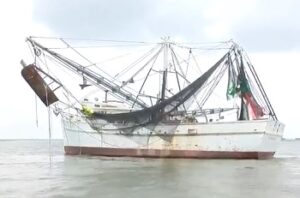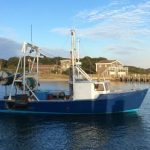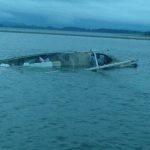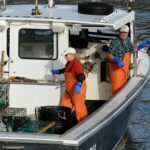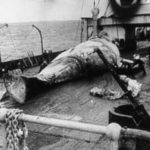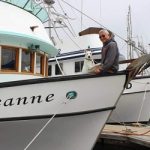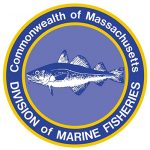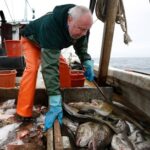Daily Archives: October 31, 2016
Bill Would Give Temporary Work Visas to Foreign Fishermen
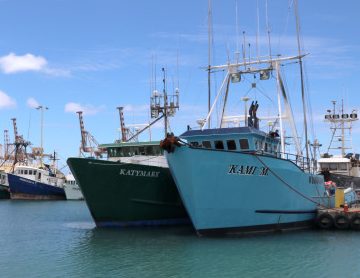 U.S. Sen. Mazie Hirono plans to introduce a bill in Congress to protect foreign fishermen from exploitation. The bill would give fishermen temporary work visas to ensure wage protections and safe working conditions. Hirono said in a statement Monday that the legislation aims to protect the fishermen while preserving the longline industry. She says the visas would allow foreign fishermen to leave their vessels while docked in Honolulu. The proposal follows an Associated Press investigation that found some fishermen have been confined to vessels for years. A federal loophole allows the foreign men to work, but it exempts them from most basic labor protections. Hirono says she’s also working with federal agencies to find solutions that don’t involve legislation. link 20:13
U.S. Sen. Mazie Hirono plans to introduce a bill in Congress to protect foreign fishermen from exploitation. The bill would give fishermen temporary work visas to ensure wage protections and safe working conditions. Hirono said in a statement Monday that the legislation aims to protect the fishermen while preserving the longline industry. She says the visas would allow foreign fishermen to leave their vessels while docked in Honolulu. The proposal follows an Associated Press investigation that found some fishermen have been confined to vessels for years. A federal loophole allows the foreign men to work, but it exempts them from most basic labor protections. Hirono says she’s also working with federal agencies to find solutions that don’t involve legislation. link 20:13
Pacific Northwest fishing industry took big hit in 2015
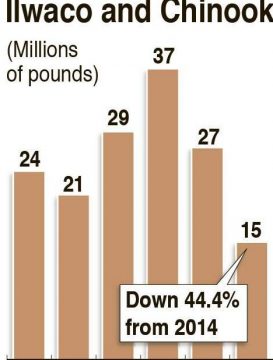 Demonstrating links between ocean health and the economy, the definitive annual federal report on U.S. fisheries released last week showed a plunge in some West Coast catches in 2015. Washington state’s total commercial catch in 2015 was 363 million pounds valued at $274.2 million, a decline of 35 percent by volume and 23.5 percent by value from 2014, according to “Fisheries of the United States 2015,” published last week by the National Marine Fisheries Service. But all was not gloom and doom: For example, West Coast landings of shrimp and albacore tuna were up, despite the warmer and less-nutritious waters associated with the ocean heat wave dubbed the Blob. This patch of warm water off the Pacific Northwest began forming in 2013 and persisted for two years before temporarily dissipating. Oregon’s commercial landings also were down, falling to about 195.5 million pounds last year, 33 percent less than in 2014. That catch was sold for $115.7 million, 26.6 percent less than 2014. How ports compare,,, Read the article here 18:07
Demonstrating links between ocean health and the economy, the definitive annual federal report on U.S. fisheries released last week showed a plunge in some West Coast catches in 2015. Washington state’s total commercial catch in 2015 was 363 million pounds valued at $274.2 million, a decline of 35 percent by volume and 23.5 percent by value from 2014, according to “Fisheries of the United States 2015,” published last week by the National Marine Fisheries Service. But all was not gloom and doom: For example, West Coast landings of shrimp and albacore tuna were up, despite the warmer and less-nutritious waters associated with the ocean heat wave dubbed the Blob. This patch of warm water off the Pacific Northwest began forming in 2013 and persisted for two years before temporarily dissipating. Oregon’s commercial landings also were down, falling to about 195.5 million pounds last year, 33 percent less than in 2014. That catch was sold for $115.7 million, 26.6 percent less than 2014. How ports compare,,, Read the article here 18:07
Keith Sullivan says FFAW will not allow 45 years of progress be torn apart by upstart FISH-NL
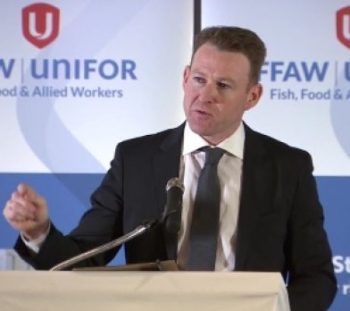 The president of Newfoundland and Labrador’s fisheries union says a breakaway group of harvesters could hurt, rather than help, their cause. Keith Sullivan of the Fish, Food and Allied Workers Union says his members are worried by an attempt to de-certify the union. “The message I am getting from the members is that we are not going to sit back and watch 45 years of progress and hard work by thousands and thousand of members be just torn apart,” Sullivan told CBC’s Central Morning Show Monday. He said the Federation of Independent Seafood Harvesters (FISH-NL), led by former journalist and member of parliament Ryan Cleary, has no real plan as to how to proceed. Sullivan acknowledges there are problems in the fishery, but the FFAW will continue to provide effective representation for its members. (and WWF!) Read the story here 16:51
The president of Newfoundland and Labrador’s fisheries union says a breakaway group of harvesters could hurt, rather than help, their cause. Keith Sullivan of the Fish, Food and Allied Workers Union says his members are worried by an attempt to de-certify the union. “The message I am getting from the members is that we are not going to sit back and watch 45 years of progress and hard work by thousands and thousand of members be just torn apart,” Sullivan told CBC’s Central Morning Show Monday. He said the Federation of Independent Seafood Harvesters (FISH-NL), led by former journalist and member of parliament Ryan Cleary, has no real plan as to how to proceed. Sullivan acknowledges there are problems in the fishery, but the FFAW will continue to provide effective representation for its members. (and WWF!) Read the story here 16:51
Operation Game Thief Reward offered for info in Hancock County lobster ‘trap war’
 An escalating “trap war” taking place in the coastal waters of Hancock County has cost lobstermen hundreds of thousands of dollars in lost gear and is prompting state officials to authorize a reward for information. The territorial dispute, in which fishermen have cut surface buoys from each others’ traps, has been heated since early summer, according to the Maine Department of Marine Resources. The cutting has been centered on the boundary line between lobster fishing zones B and C, which runs through Blue Hill Bay from Newbury Neck in Surry to Swan’s Island. “This trap war is without a doubt the most costly loss of gear I have witnessed in my 32-year career with the Maine Marine Patrol,” Col. Jon Cornish, head of DMR’s law enforcement division, said Monday. “In this instance, [total] gear loss is estimated to far exceed $350,000 dollars.” Read the story here 16:01
An escalating “trap war” taking place in the coastal waters of Hancock County has cost lobstermen hundreds of thousands of dollars in lost gear and is prompting state officials to authorize a reward for information. The territorial dispute, in which fishermen have cut surface buoys from each others’ traps, has been heated since early summer, according to the Maine Department of Marine Resources. The cutting has been centered on the boundary line between lobster fishing zones B and C, which runs through Blue Hill Bay from Newbury Neck in Surry to Swan’s Island. “This trap war is without a doubt the most costly loss of gear I have witnessed in my 32-year career with the Maine Marine Patrol,” Col. Jon Cornish, head of DMR’s law enforcement division, said Monday. “In this instance, [total] gear loss is estimated to far exceed $350,000 dollars.” Read the story here 16:01
Santa Cruz harbor mouth dredging scheduled to begin
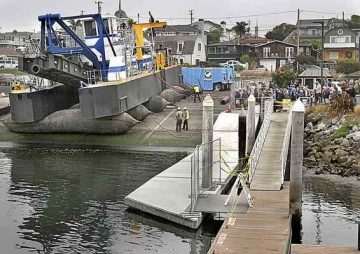 As crab season approaches, work to dredge the Santa Cruz Small Craft Harbor’s mouth is scheduled to begin Nov. 7. The new dredging season, coming after a difficult El Niño-plagued previous winter plagued by harbor mouth closures, is the maiden voyage for new harbor dredge, the Twin Lakes. Dredge builder DSC Dredge and port district’s dredging consultant CF Bean will be on hand for equipment setup, crew training and efficiency testing, Port Director Lisa Ekers said. Work has already begun elsewhere in the harbor, with crews initially focusing on north harbor dredging and installation of dredge equipment add-ons, according to Ekers. Read the rest here 13:54
As crab season approaches, work to dredge the Santa Cruz Small Craft Harbor’s mouth is scheduled to begin Nov. 7. The new dredging season, coming after a difficult El Niño-plagued previous winter plagued by harbor mouth closures, is the maiden voyage for new harbor dredge, the Twin Lakes. Dredge builder DSC Dredge and port district’s dredging consultant CF Bean will be on hand for equipment setup, crew training and efficiency testing, Port Director Lisa Ekers said. Work has already begun elsewhere in the harbor, with crews initially focusing on north harbor dredging and installation of dredge equipment add-ons, according to Ekers. Read the rest here 13:54
Scientists warn Government against recommendations to wind back marine reserves – In particular ‘no-take’ zones
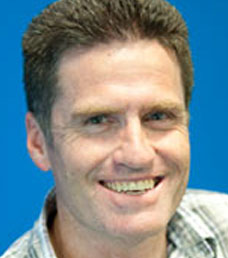 A group of scientists is urging the Government not to wind back the scale of the nation’s 40 marine reserves, contrary to the advice of an advisory panel on the matter. The panel is recommending the removal of an area almost twice the size of Tasmania from the protected zones where mining and fishing are banned. But the scientists, known as the Ocean Science Council, said cuts of that size could be devastating to marine life. Professor David Booth, a member of the council and a professor of marine ecology, said he and his colleagues had concerns over the advice given to the Government. “We welcome the review, there are a lot of good points to it, but what we’re really concerned with is these bioregional panels — which recommended the zoning of the parks in areas around Australia — fall well short of what was recommended,” he said. “In particular, the marine national park ‘no-take’ zones, which are the gold standard for looking after marine biodiversity, have been eroded.” Read the story here 12:47
A group of scientists is urging the Government not to wind back the scale of the nation’s 40 marine reserves, contrary to the advice of an advisory panel on the matter. The panel is recommending the removal of an area almost twice the size of Tasmania from the protected zones where mining and fishing are banned. But the scientists, known as the Ocean Science Council, said cuts of that size could be devastating to marine life. Professor David Booth, a member of the council and a professor of marine ecology, said he and his colleagues had concerns over the advice given to the Government. “We welcome the review, there are a lot of good points to it, but what we’re really concerned with is these bioregional panels — which recommended the zoning of the parks in areas around Australia — fall well short of what was recommended,” he said. “In particular, the marine national park ‘no-take’ zones, which are the gold standard for looking after marine biodiversity, have been eroded.” Read the story here 12:47
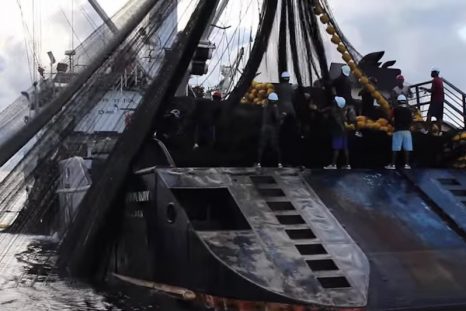
Successful PNA vessel days scheme
Five years ago managing the PNA fisheries was mostly done with a calculator and pencil, and with data sent by fax or email. Today, the fishery that is generating US$400 million a year to nine Pacific islands is managed by the Parties to the Nauru Agreement’s Fisheries Information Management System (FIMS) that allows managers to know what is taking place in their fishing zone with a tap of their computer keyboards. ‘It provides easy access to fisheries information for increasingly effective management of PNA’s Vessel Day Scheme (VDS) that governs purse seine fishing in the western and central Pacific,’ said PNA CEO Ludwig Kumoru, who added that the VDS and the FIMS management tool is also being rolled out for the longline industry. ‘FIMS shows each party’s usage of fishing days and the percentage of days left,’ said Ms. Jack. The PNA Office coordinates this fishing day data with each fishery department in the nine islands using the VDS, including resolving any differences between the national fishery department and the PNA Office in determining fishing day usage. Day-to-day VDS management of fishing day data translates directly into major revenue for each VDS participant. Between 2010 and 2015, revenue to the islands rose from US$60 million to close to US$400 million. Watch the video,Read the story here 11:07
1st Biloxi Bay oyster harvest of 21st century opens Tuesday
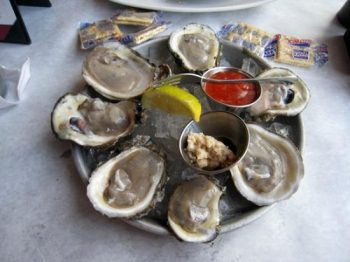 For the first time in at least 40 years, Biloxi Bay will open for oyster harvesting. The state Department of Marine Resources said in a news release reefs in the Biloxi Bay portion of the Mississippi Sound will open at sunrise Tuesday. DMR Executive Director Jamie Miller says the harvest of oysters for the first time in 40-plus years in Biloxi Bay is nothing less than historic. Miller says the opening of the oyster reefs confirms water quality has improved in the Bay. Officials say harvesting is limited to oyster tonging. No dredging will be allowed. The limit is 15 sacks per day. Artificial reefs will not be open for oyster harvesting. There will be a station in the Ocean Springs Harbor for fishermen to check in and out each day. link 10:26
For the first time in at least 40 years, Biloxi Bay will open for oyster harvesting. The state Department of Marine Resources said in a news release reefs in the Biloxi Bay portion of the Mississippi Sound will open at sunrise Tuesday. DMR Executive Director Jamie Miller says the harvest of oysters for the first time in 40-plus years in Biloxi Bay is nothing less than historic. Miller says the opening of the oyster reefs confirms water quality has improved in the Bay. Officials say harvesting is limited to oyster tonging. No dredging will be allowed. The limit is 15 sacks per day. Artificial reefs will not be open for oyster harvesting. There will be a station in the Ocean Springs Harbor for fishermen to check in and out each day. link 10:26
Unusual policy allows Massachusetts Environmental Police to interrupt shifts to work private details
 For a decade, the Massachusetts Environmental Police have operated under an unusual paid-detail policy that national law-enforcement experts warn could jeopardize officers’ commitment to public safety. The practice, known as splitting shifts, allows Environmental Police officers to interrupt their regularly scheduled duties to work a paid detail, provided that they return to work afterward and complete their required hours. It is virtually unheard of among police departments, but a similar policy was in place in New Orleans when the Department of Justice X-rayed that city’s Police Department in 2011. The federal agency found that the NOPD’s split-shift policy was a possible incentive for officers to prioritize extra money over public safety. “Just looking at it from a distance, it looks like it would complicate the ability to separate public work from private work, and that is a huge problem,” said Ed Davis, the former superintendent of the Lowell and Boston police departments. He and other law-enforcement experts questioned whether an Environmental Police officer would be as likely to make an arrest or take any police action if that action meant the officer wouldn’t be able to make it to a private paid detail on time. Read the story here 09:47
For a decade, the Massachusetts Environmental Police have operated under an unusual paid-detail policy that national law-enforcement experts warn could jeopardize officers’ commitment to public safety. The practice, known as splitting shifts, allows Environmental Police officers to interrupt their regularly scheduled duties to work a paid detail, provided that they return to work afterward and complete their required hours. It is virtually unheard of among police departments, but a similar policy was in place in New Orleans when the Department of Justice X-rayed that city’s Police Department in 2011. The federal agency found that the NOPD’s split-shift policy was a possible incentive for officers to prioritize extra money over public safety. “Just looking at it from a distance, it looks like it would complicate the ability to separate public work from private work, and that is a huge problem,” said Ed Davis, the former superintendent of the Lowell and Boston police departments. He and other law-enforcement experts questioned whether an Environmental Police officer would be as likely to make an arrest or take any police action if that action meant the officer wouldn’t be able to make it to a private paid detail on time. Read the story here 09:47

































